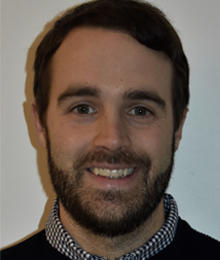An interview with Dr Daniel Neill
June 2020
Dr Daniel Neill is Group Leader at the Institute of Infection and Global Health at the University of Liverpool, and a member of the Microbiology Society. In this interview, he tells us more about his research in trying to understand the bacterial pathogens Streptococcus pneumoniae and Pseudomonas aeruginosa, including how they adapt and evolve.

What is your role and area of research?
I am a Group Leader at the Institute of Infection and Global Health, University of Liverpool. My research team studies bacterial infections of the airways. We are interested in how different aspects of the airway environment can shape the evolution of bacterial pathogens and how this contributes to patterns of disease and to antimicrobial resistance. About half of my lab works on Streptococcus pneumoniae, a major cause of death in children and the elderly. The other half focus on Pseudomonas aeruginosa, a cause of long-term, difficult to treat infections in people with compromised lung function, such as those with cystic fibrosis.
Why is your research important?
Around one million children a year die of disease caused by Streptococcus pneumoniae, making it one of the biggest causes of death due to infectious disease worldwide. In people with cystic fibrosis, lung infection with Pseudomonas aeruginosa contributes to declining lung function and is a major cause of death. Both of these bacterial pathogens spend a lot of time in their human hosts and therefore have ample opportunity to adapt to their environment.
We try to understand how aspects of the airway environment drive this process of bacterial adaptation. For example, we know that defence molecules produced by our immune systems put stress on bacteria. If an infecting bacterium acquires resistance to these molecules, then it is better able to survive and outcompete other infecting strains. It may also become more difficult to eradicate the infection and we know that when bacteria acquire resistance to host defence molecules, they can sometimes also become resistant to antibiotics.
A better understanding of the processes that drive bacterial adaptation and evolution will help us develop new therapies and vaccines that target bacterial factors involved in the disease-causing process.
What are the challenges you face in your work and how do you try to overcome them?
Research is constantly challenging, but that is part of what makes it exciting, and I enjoy trying to understand why we have an unexpected result in the lab or why a particular method isn’t working. For me, the more daunting challenges involve managing a research team. I am very fortunate that my lab group are a lovely, talented bunch, but it is a big responsibility to know that the decisions that I make can have a major impact on their careers. I share their sadness and frustration when things aren’t going well, but happily I can also enjoy their successes.
The other big challenge I face is networking! I’m a naturally shy person, particularly in groups, so for years I struggled at conferences. Science undoubtedly works best when people share ideas and combine their experience, and I have some wonderful collaborators but making those initial connections has never come naturally to me. Someone once told me to set myself achievable goals for each conference I go to. Something like, “I’ll talk to at least two new people” or “I’ll introduce myself to that person whose research paper I enjoyed.” That has really helped, but I still make sure I take at least one evening to myself to relax and unwind at every conference I attend.
What is a typical working day for you?
No two days are the same in this job, which is something I love. Over the course of a week, I’ll probably spend a fifth of my time talking with postdocs and PhD students about their latest research findings, a fifth of my time teaching or supervising undergraduates, another fifth writing grants or papers and the rest sitting in meetings, answering emails and generally trying to keep on top of the paperwork. On a good week, I still manage to get into the lab to run an experiment, although I no longer know where anything is and my lab group would no doubt argue that things run more smoothly when I stay in the office.
Why is it important to be a member of an organisation like the Microbiology Society?
The Microbiology Society does a lot of important work both for microbiology researchers and for the public, by promoting a better understanding of the role microbes play in all our lives. The research we do is for the public good (not to mention that much of it is taxpayer funded!) and so it is vital that we spread the word about microbiology and help people understand why we do what we do and how it might make a difference to their lives.
Why does microbiology matter?
Microbes are essential to life on Earth. They contribute to the life cycles that sustain the planet, breaking down animal and plant matter to return nutrients to the soil and prepare the way for new growth. Microbes are also a crucial part of all of us. The bacteria in our digestive system help us to digest our food and fight off infections. Lastly, and most importantly in my opinion, without microbes, we wouldn’t have beer!


